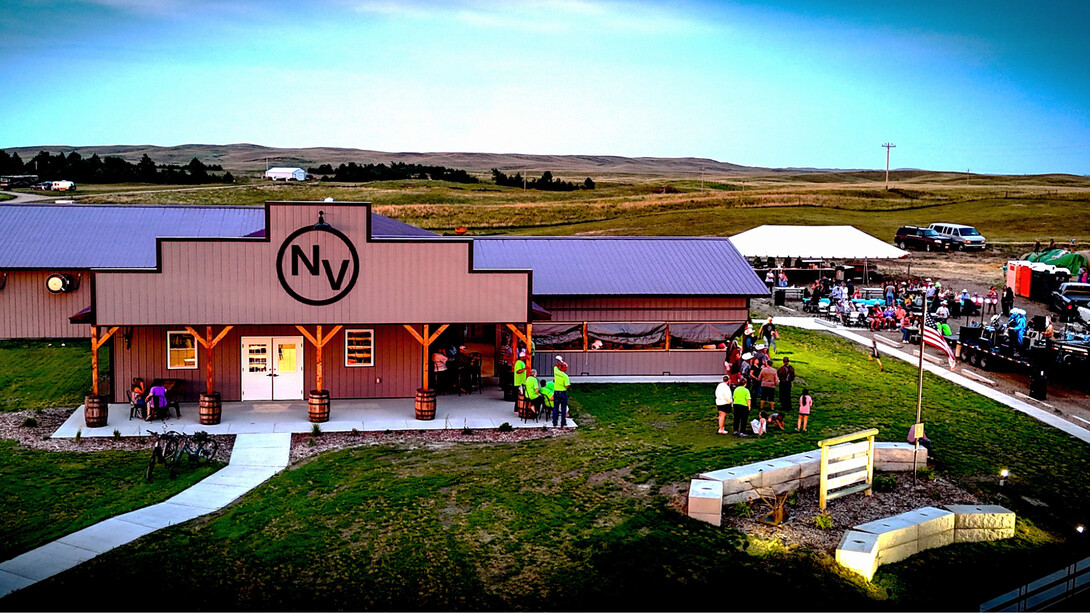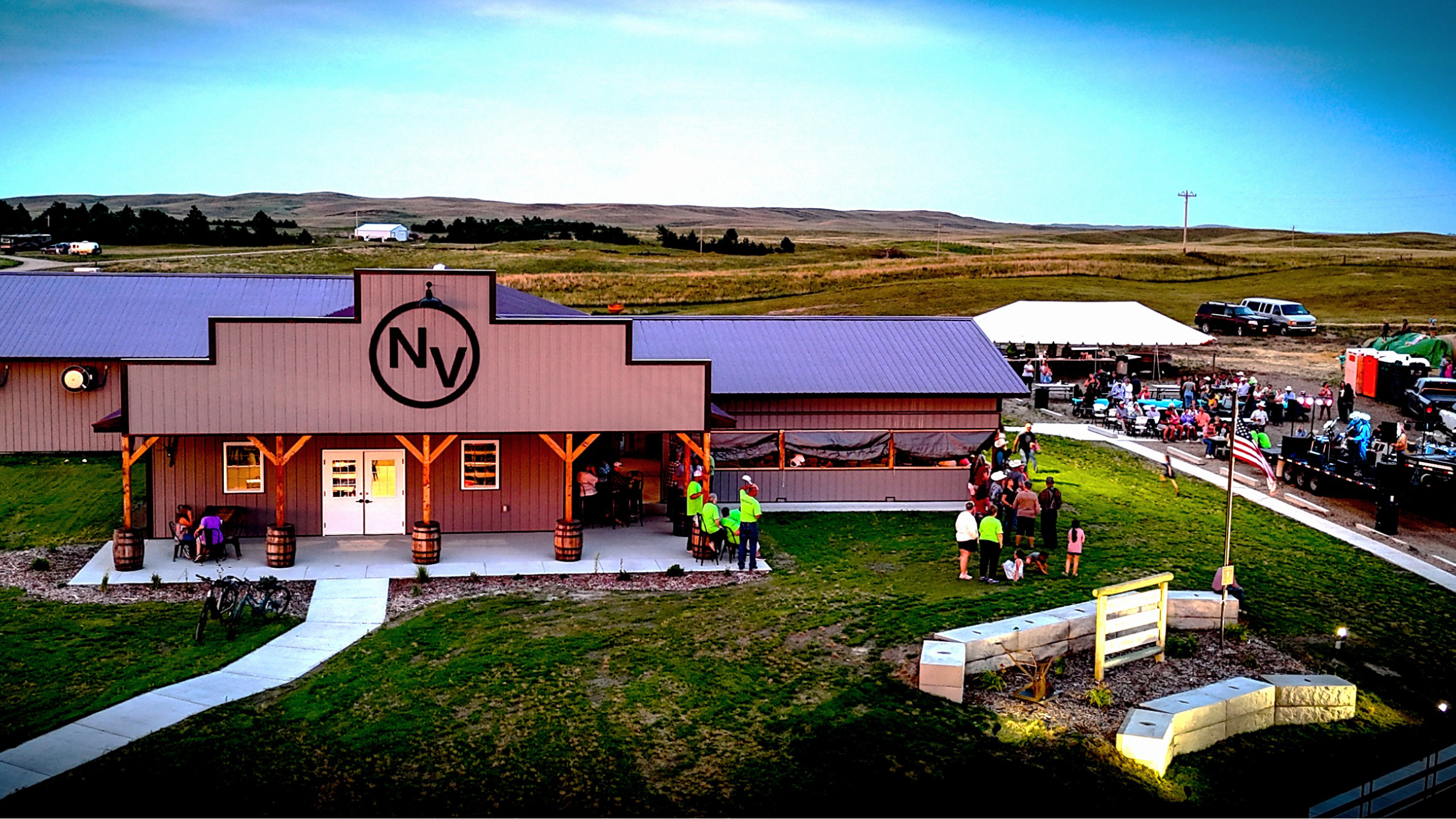
When Niobrara Valley Vineyards constructed a new facility, co-owner Greg Nollette said he felt somewhat unequipped to face some of the new challenges that came with it.
“We created a destination or attraction for people to come to in the country,” Nollette said. “With that came a whole host of new skills we needed to be successful.”
The vineyard, located near the village of Nenzel in north-central Nebraska, navigated this significant expansion with the help of an entrepreneurship coach from Rural Prosperity Nebraska. The coaching program helps rural businesses thrive by creating a network of support and resources for entrepreneurs.
“These coaching and mentoring systems are a great strategy to positively impact our rural economies,” said Shawn Kaskie, Extension educator with Rural Prosperity Nebraska and community economic development and leadership facilitator.
The program has been in place for about four years and is based on a framework created by Don Macke to develop community support for local businesses. Kaskie said especially in the wake of the COVID-19 pandemic, businesses needed help to survive, and he applied for grants through the U.S. Economic Development Administration and then the U.S. Department of Agriculture. The program has engaged businesses in 22 Nebraska counties.
“It was really a struggle for all businesses,” Kaskie said. “Our Extension Rural Prosperity economy team wanted to do something about it for the areas we serve.”
Nollette came across the coaching program while looking for similar resources and has been working with a coach for about two years. The family-owned business started in 2002 as a grape grower for a vinegar company. They started making wine about 10 years ago. In the last few years, they added food service to their offerings.
As the business grew, Nollette wanted support to continue that success. The backgrounds of Nollette and his brother, who is co-owner, were in agriculture education, so the program offered its own form of business education.
“We probably didn’t have the business skills necessary to tackle the expansion we made,” Nollette said. “We had a formal education, but it wasn’t in the type of businesses we’re doing now.”
Niobrara Valley Vineyard’s recent expansion included a new tasting room, event center and RV park. Nollette said during this time, they were seeking help to transition from doing business on their own ranch to their new facility.
“If this business was going to continue, we needed to grow, so we needed to do a larger volume of business than what we were doing at the time,” Nollette said.
Kaskie said this is a common challenge for rural areas, where there is a smaller pool of resources for both hiring and sales. Many of these entrepreneurs are trying to cover larger geographic areas with smaller marketing budgets, making it more difficult to turn a profit.
“Profit margins in rural areas are narrower than in an urban area, where there’s more people and sales potential for service and some retail-based businesses,” Kaskie said. “We have to be really mindful and creative about keeping menus fresh, keeping services fresh, keeping the financial systems as efficient as they can. And our coaches talk through all of those issues with the businesses.”
Travis Barker, Nollette’s current coach, owns a cybersecurity consulting firm in Broken Bow, Nebraska, and said the resource would have been helpful to him when he was starting out. Barker has worked with coaches himself and understands the value of having someone to offer that guidance.
“My family owned businesses, but no one could really answer my questions,” Barker said. “If this was available to me when I was starting my business, it would have been a game changer. It would have shortened my learning cycle immensely.”
Barker aims to help businesses set realistic goals and identify how their concept can add value to the community. Each client needs guidance in different areas, whether it’s structuring their leadership and personnel, getting a better understanding of their cashflow or finding new ways of marketing and advertising.
“They’re all in different parts of their journey,” Barker said. “The first thing I try to understand is, what do they want?”
Through coaching, Nollette said he learned more about marketing, point of sale systems, standard operating procedures and funding resources such as grants available to them. Nollette and Barker have recently worked on a thorough financial analysis of Niobara Valley Vineyards, which Nollette said made it easier to identify the business’s most profitable aspects and how they can best allocate their time and money.
“Whatever problem we had, they were more than willing to help us find an answer,” Nollette said. “Even if they may or may not have had the expertise, they had the resources and could give them to us.”
Nollette values Barker’s deep interest in the success of his business, he said, and he has found it helpful to have someone to talk to as a sounding board. He said “growing that personal relationship makes all the difference in the world.”
“He’s devoted to this project,” Nollette said. “He was very genuine in his concern about our business.”
For Kaskie, strengthening rural business capacity contributes to the overall quality of life in these small towns. Ensuring that places like restaurants, pharmacies, grocery stores and other businesses remain open makes it sustainable for families to remain in those towns, as well.
Kaskie wants to build a support structure for these rural businesses that outlasts their time with a coach and can help bolster local entrepreneurs for years to come.
“Our mission is education,” he said. “I’m hoping that these businesses that have been supported by these coaches will continue to think of innovate ways to offer new services, offer new products, to think about new markets. I hope they’re learning strategies to maintain profit even after the formal coaching relationship ends. If the businesses are successful, the communities are successful.”
Learn more about Rural Prosperity Nebraska's eCommunities program.








